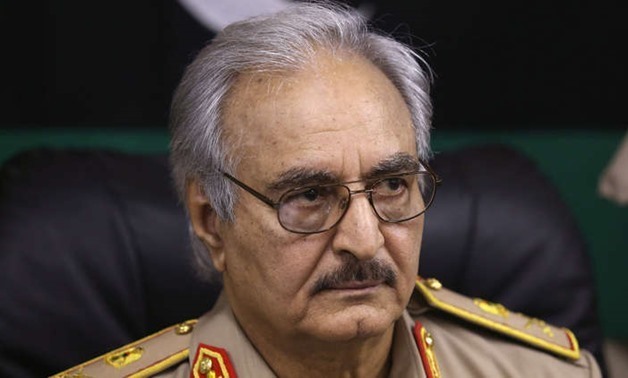
Field Marshal Khalifa Haftar, commander of the Libyan National Army / press photo
CAIRO – 4 January 2020: The Libyan Parliament held Saturday an emergency session, in which it voted on a bundle of decisions, including the rejection of the MoUs inked between the Government of National Accord (GNA) and Turkey.
According to the official spokesperson for the Libyan Parliament Abdullah Belihaq, the parliament voted unanimously on authorizing the General Commander of the Libyan National Army Khalifa Haftar to disable airports, ports, and land gates that are controlled by the militias.
The House of Representatives on Saturday approved the allocation of an emergency budget for the armed forces worth 20 billion Libyan dinars ($14.3M), to be deducted from the state budget of the year 2020.
Belhiq added that the Libyan parliament also unanimously voted to cut relations with Turkey, and close the embassies between both countries.
The parliament further agreed, during its voting session, to address international organizations such as the UN Security Council, the League of Arab States, the African Union, the European Union and other international organizations to withdraw the recognition of the GNA, which is led by Fayez el-Sarraj.
Saturday’s emergency session was held to discuss the blatant Turkish military intervention, and has witnessed an unanimous approval by members to refer all signatories of the GNA-Turkey MoUs on military and maritime jurisdictions to Libya’s top prosecutor, accusing them of high treason. The parliament justified the charge drawn against signatories, including Sarraj, as they agreed to bring foreign occupation as represented in Turkish troops to the Libyan soil.
In the same context, African Union chief Moussa Faki Mahamat expressed on Saturday his utter concern over potential interference in Libya, after Turkey approved the deployment of troops to the country.
Al Azhar's Senior Scholars Authority (SSA) held an emergency meeting on Saturday, during which it condemned foreign interference on Libyan territories, describing it as “corruption that would further complicate the situation in Libya, spill more blood and kill innocent lives.”
The authority also called upon international institutions to shoulder responsibility of maintaining international peace and security, and to prevent this interference before it takes place.
In its statement, the authority also rejected the guardianship concept claimed by some regional countries, as a pretext to violate other countries’ sovereignty.

Comments
Leave a Comment